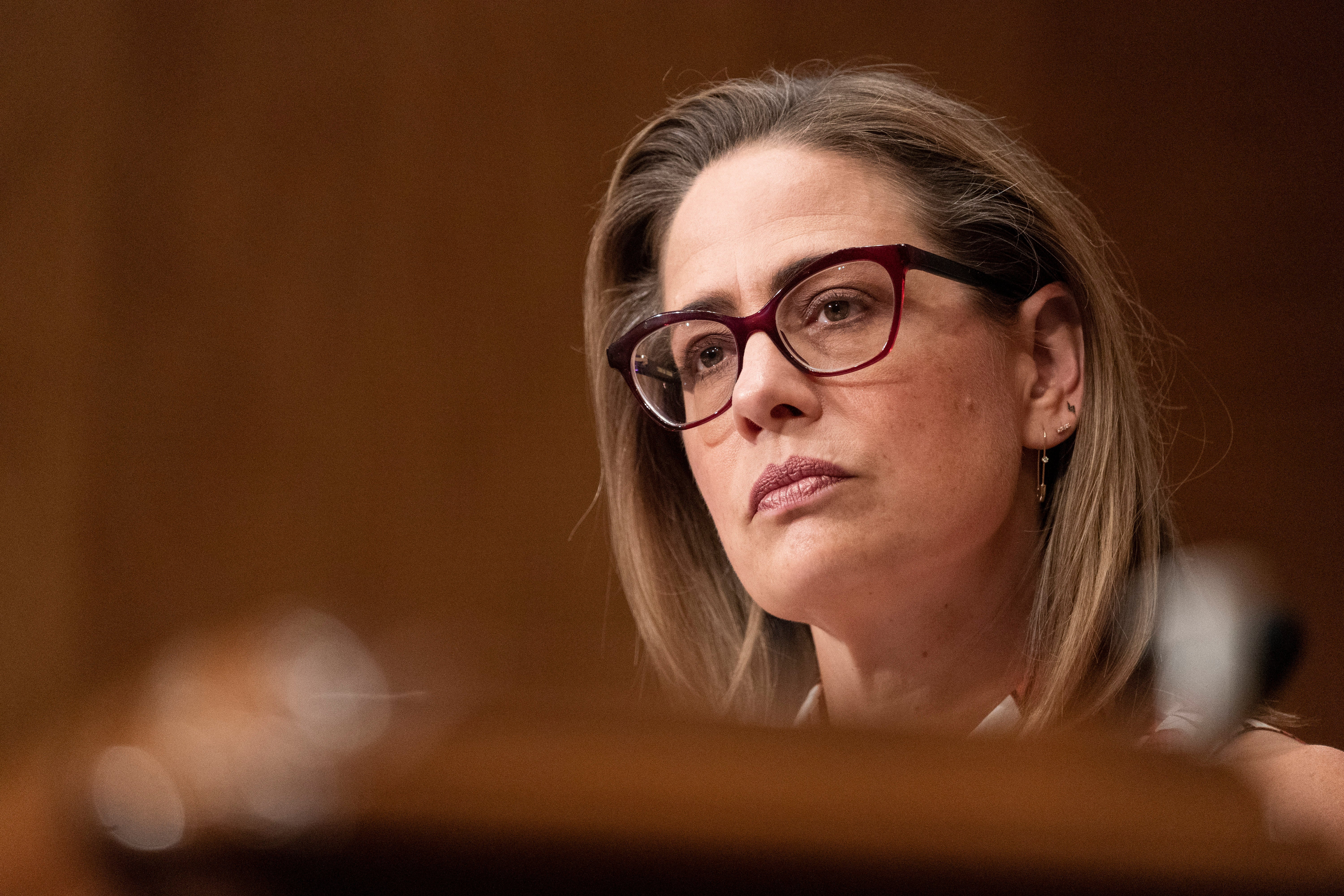Kyrsten Sinema isn’t so special any more. She’ll have to change her strategy
Progressive Democrats have been quick to criticize the Senator from Arizona — but the truth is a little more complex than that. Still, her state is changing and that means evolving with it


Your support helps us to tell the story
My recent work focusing on Latino voters in Arizona has shown me how crucial independent journalism is in giving voice to underrepresented communities.
Your support is what allows us to tell these stories, bringing attention to the issues that are often overlooked. Without your contributions, these voices might not be heard.
Every dollar you give helps us continue to shine a light on these critical issues in the run up to the election and beyond

Eric Garcia
Washington Bureau Chief
On Wednesday, the Senate opted to proceed with legislation to codify same-sex marriage. Ahead of the vote, Senator Kyrsten Sinema, the often sphinx-like Democrat from Arizona, delivered a speech on her trademark theme of bipartisan cooperation.
“Amidst the noise, a few hardworking Senators from across our country and across the political spectrum understood there was a need to provide certainty to the American people,” she told the chamber, “and we came to the table to get something done.”
Indeed, she negotiated the bill with fellow Democratic Senator Tammy Baldwin – the first openly LGBTQ+ Senator – and Republican Senators Susan Collins of Maine, Thom Tillis of North Carolina and Rob Portman of Ohio, who is retiring in January and whose son is gay.
Sinema has earned the ire of many of her Democratic colleagues for a litany of reasons. Most notably, she continues to support the filibuster, even defending it at Mitch McConnell’s namesake center at the University of Louisville. She enraged many online progressives during a vote to add a $15 minimum wage increase into the American Rescue Plan after the Senate Parliamentarian’s office said it didn’t pass budget muster, giving a thumbs down.
Then in August, she nearly sank the Inflation Reduction Act when she and six other Democrats voted for an amendment by Senator John Thune, which passed, but Democrats included a substitute amendment afterwards.
All this aside, many on the left cannot deny that she has racked up some important wins. She served as the main negotiator with Portman on the bipartisan infrastructure bill and worked with Tillis, Republican Senator John Cornyn and Democratic Senator Chris Murphy on gun legislation. And in the end, 12 Republicans yesterday voted to allow the same-sex marriage legislation to proceed to a full vote.
Nonetheless, Sinema’s fellow Democrats are furious at her for going missing in action while her party engaged in tough fights in Arizona – particularly Senator Mark Kelly’s re-election campaign and Katie Hobbs’s gubernatorial campaign against Republican former news anchor Kari Lake. When former president Barack Obama headed to Arizona, Sinema was nowhere to be seen. Arizona Congressman Ruben Gallego, who some speculate will challenge her in a primary in 2024, complained that she “did nothing” to help.
But the truth is a bit more complicated than that. While she did not campaign visibly around Arizona with Kelly, Sinema’s Getting Stuff Done leadership PAC did give him the legal maximum of $5,000 in the primary election and an additional $5,000 in the general election, according to OpenSecrets. She did the same for the re-election campaigns of Senators Catherine Cortez Masto in Nevada, Raphael Warnock in Georgia, Patty Murray in Washington state and Maggie Hassan in New Hampshire. (The PAC also gave $5,000 to Tim Ryan’s failed Senate race in Ohio and moderate Republican Senator Lisa Murkowski’s re-election race in Alaska, among others.)
At the same time, the earth underneath Sinema’s home state is shifting. When she won her first race in 2018, she became the first Democrat to win a Senate race in Arizona since 1988. That same year, Katie Hobbs captured the Secretary of State’s office while Republicans held the governorship and the attorney general’s race.
Now, Hobbs is the first Democrat Arizona has elected governor since 2006; Kelly’s victory means the state still has two Democratic Senators; Democrat Adrian Fontes beat back election-denier Mark Finchem to hold the secretary of state’s office; and the attorney general race remains too close to call (full disclosure: the Republican nominee Abraham Hamadeh is an old friend). At the same time,
Above all, Joe Biden’s 2020 victory signaled that Arizona is no longer a solidly red state, but rather a highly competitive one.
The state has now voted for candidates in all shades of blue – and that means Sinema can no longer hold herself out as the only type of Democrat who can win. That may make her skills as a dealmaker all the more essential when she campaigns for her first re-election race.
This article was amended on November 18. It previously said that said Sen Sinema gave a curtsy during the minimum wage vote when she did not. The story also previously said that Mr Thune’s amendment did not pass, when it did
Join our commenting forum
Join thought-provoking conversations, follow other Independent readers and see their replies
Comments